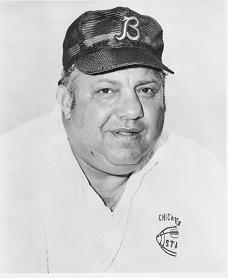Abe Gibron

Gibron while coach of the Chicago Bears
|
|||||||||
| No. 34, 64, 67 | |||||||||
|---|---|---|---|---|---|---|---|---|---|
| Position: | Guard, head coach | ||||||||
| Personal information | |||||||||
| Date of birth: | September 22, 1925 | ||||||||
| Place of birth: | Michigan City, Indiana | ||||||||
| Date of death: | September 23, 1997 (aged 72) | ||||||||
| Place of death: | Belleair, Florida | ||||||||
| Height: | 5 ft 11 in (1.80 m) | ||||||||
| Weight: | 243 lb (110 kg) | ||||||||
| Career information | |||||||||
| High school: | Elston (IN) | ||||||||
| College: | Valparaiso, Purdue | ||||||||
| NFL Draft: | 1949 / Round: 6 / Pick: 55 | ||||||||
| Career history | |||||||||
| As player: | |||||||||
|
|||||||||
| As coach: | |||||||||
|
|||||||||
| Career highlights and awards | |||||||||
| Career NFL statistics | |||||||||
|
|||||||||
| Player stats at PFR | |||||||||
| Coaching stats at PFR | |||||||||
| Games played: | 116 |
|---|---|
| Win-loss record (NFL): | 11–30–1 |
| Winning percentage: | .268 |
| Player stats at NFL.com | |
Abraham "Abe" Gibron (September 22, 1925 – September 23, 1997) was a professional American football player and coach. Gibron played 11 seasons as a guard in the All-America Football Conference (AAFC) and National Football League (NFL) in the 1940s and 1950s, mostly with the Cleveland Browns. He was then hired as an assistant coach for the NFL's Washington Redskins and Chicago Bears before becoming head coach of the Bears between 1972 and 1974.
Gibron grew up in Indiana, where he was a standout athlete in high school. After graduating, he spent two years in the U.S. military during World War II, enrolling at Valparaiso University upon his discharge. He later transferred to Purdue University, where he played football for two years and was named an All-Big Ten Conference guard. Gibron's professional career began in 1949 with the Buffalo Bills of the AAFC. The league dissolved after that season, however, and he moved to the Browns in the NFL. While he was initially a substitute, Gibron developed into a strong lineman on Cleveland teams that won NFL championships in 1950, 1954 and 1955 behind an offensive attack that featured quarterback Otto Graham, end Dante Lavelli and tackle Lou Groza. He was named to the Pro Bowl, the NFL's all-star game, each year between 1952 and 1955.
...
Wikipedia
